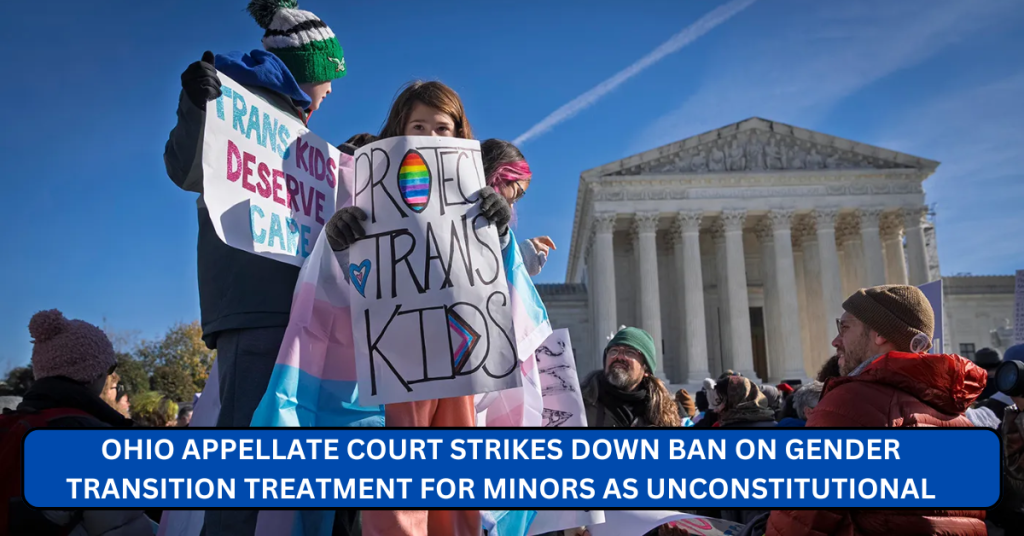
March 18, 2025 – Columbus, Ohio – In a landmark decision, Ohio’s Tenth District Court of Appeals has ruled that the state’s ban on gender-affirming medical care for minors is unconstitutional, effectively blocking its enforcement. The ruling, delivered in a 2-1 decision, overturns a lower court’s verdict that had allowed the law to take effect.
Background of the Law
The contested legislation, House Bill 68 (HB 68), sought to prohibit healthcare providers from prescribing puberty blockers, hormone therapies, and performing gender-affirming surgeries for individuals under 18. Additionally, it restricted transgender girls and women from participating in female sports. The bill was initially passed by Ohio lawmakers and signed into law despite opposition from civil rights groups and medical associations.
The American Civil Liberties Union (ACLU), along with parents of transgender minors and medical professionals, challenged the law in court, arguing that it infringed upon parental rights and equal protection under the law.
Court’s Reasoning
In its majority opinion, the appellate court ruled that the legislation discriminates against transgender youth by selectively banning gender-affirming treatments while allowing the same medical procedures for other conditions. The judges emphasized that parents have a fundamental right to make medical decisions for their children without unnecessary government intervention.
“The law unfairly targets transgender minors by preventing them from accessing medical care that is widely recognized as safe and effective,” the court stated in its ruling. “The state has failed to provide compelling evidence to justify such discrimination.”
Reactions to the Ruling

The decision has drawn mixed reactions from political leaders, advocacy groups, and legal experts.
Supporters of the Ruling:
- LGBTQ+ rights advocates and medical organizations hailed the ruling as a victory for bodily autonomy and equal rights.
- The ACLU of Ohio, which was a plaintiff in the case, celebrated the verdict, calling it “a major win for Ohio families and transgender youth.”
- Healthcare professionals, including the American Academy of Pediatrics, have long argued that gender-affirming care is essential and medically necessary for transgender minors experiencing gender dysphoria.
Opposition to the Ruling:
- Ohio Attorney General Dave Yost has announced plans to appeal the decision, stating, “This ruling undermines the role of the legislature in protecting children from experimental medical treatments.”
- Conservative lawmakers and advocacy groups supporting HB 68 argue that gender-affirming treatments are irreversible and should not be available to minors.
Legal and National Implications
Ohio’s ruling comes amid a broader legal battle over transgender rights in the United States. Several states, including Montana and Indiana, have seen similar laws blocked by courts, while others continue to enforce restrictions on gender-affirming healthcare.
This decision could set a legal precedent for future challenges against state-level bans on gender-affirming care. If the case reaches the Ohio Supreme Court, it may further shape the legal landscape on this issue.
What’s Next?

Following the ruling, the state government may seek an appeal with the Ohio Supreme Court or push for new legislative measures. In the meantime, transgender minors in Ohio will continue to have access to gender-affirming care, as the appellate court’s ruling prevents the enforcement of HB 68.
Families and individuals seeking gender-affirming healthcare can refer to the official websites of the Ohio Department of Health and U.S. Department of Health & Human Services for information on medical guidelines and patient rights.
For further details on the ruling, legal documents, and future updates, visit the Supreme Court of Ohio.
Conclusion
The Ohio appellate court’s decision marks a significant moment in the ongoing legal battles over transgender rights in the U.S. While the ruling provides relief for affected families, the case is far from over as state officials gear up for a potential appeal. As legal challenges continue, the future of gender-affirming care in Ohio remains a key issue for policymakers, medical professionals, and advocates on both sides of the debate.



